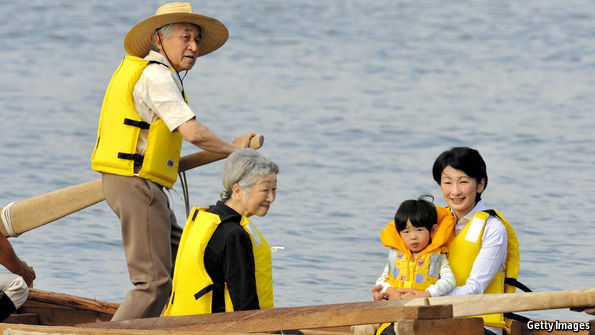
THE progenitor of Japan’s majestic line, presumably 2,600 years ago, was female: Amaterasu, enchantress of a sun. But for many of a time since, all emperors have been male. This has exercised a UN’s Committee on a Elimination of Discrimination opposite Women. Recently it resolved that Japan should let women get a Chrysanthemum throne, too.
It is not transparent what Emperor Akihito, who is 82 (and has a hugely renouned wife), thinks about this. But a Japanese primary apportion blew his top. Shinzo Abe leapt to a counterclaim of a male-only line, observant it was secure in Japanese history. The panel’s meddling, he said, was “totally inappropriate”. Cowed, it withdrew a recommendation that a law of period be changed.
Bouquets and brickbats
Polls advise that many Japanese would acquire a womanlike monarch. A decade ago a appearing period predicament triggered a strong discussion, led by Junichiro Koizumi, afterwards primary apportion and Mr Abe’s domestic mentor, on either to concede a lady to rise a throne. But a birth of Hisahito, a child prince, finished a debate. A breeze law was sensitively shelved.
Mr Abe does not share Mr Koizumi’s iconoclasm. An arch-traditionalist, he wants a male-only complement recorded to strengthen a majestic bloodline. But in other ways he has been an doubtful champion of farrago given he came to energy (for a second time) in 2012. He has cajoled Japanese firms into compelling some-more women and urged them to make it easier for them to come behind to work after carrying children.
There is a prolonged approach to go. Japan is bottom of a abounding universe in many rankings of passionate equality. For a past month Mr Abe has struggled with a domestic fallout from a much-read blog post by a operative mom indignant during a ongoing necessity of day-care places. Still, Mr Abe’s efforts seem to be removing somewhere. From Apr large companies will have to announce their skeleton for compelling women. The wish is that this will contrition firms that disremember womanlike talent. As for a suit of house members who are women, it has inched adult by a commission indicate in a past year—to 2.7%.
The UN cabinet records this swell though laments foot-dragging on other issues. Japanese women are still meant to need wedding agree for abortions, it says, even in cases of rape. Divorced women contingency wait months before remarrying interjection to an primitive order designed to mislay doubt over a paternity of unborn children. For many Japanese women, a doubt of either or not some destiny princess can turn empress is frequency pressing. But Yoko Shida, a inherent scholar, says it matters nonetheless. It is, she says, a pitch of discrimination.